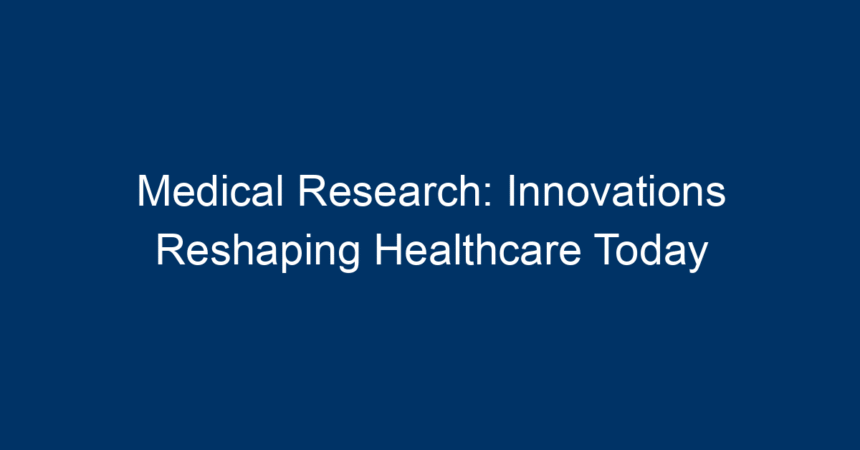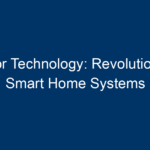In recent years, medical research has become a cornerstone of healthcare advancement, sparking innovations that are transforming patient care and treatment methodologies. From genomics to telemedicine, the strides made in medical science are not merely incremental; they are revolutionary, offering new hope for patients and propelling the healthcare system into an era of unprecedented efficiency and effectiveness. This article delves into the key innovations arising from medical research that are currently reshaping healthcare, their implications for the future, and actionable insights for stakeholders in the field.
The Importance of Medical Research
Driving Innovation and Discovery
Medical research plays a pivotal role in discovering new drugs, therapies, and treatment protocols. It enables scientists and healthcare professionals to understand diseases better, develop novel therapeutic approaches, and improve existing treatment modalities. This continuous quest for knowledge is essential for addressing both prevalent and emerging health challenges.
Enhancing Patient Outcomes
At its core, the purpose of medical research is to enhance patient outcomes. By studying disease mechanisms and treatment effects, researchers can identify the most effective interventions. Clinical trials, observational studies, and meta-analyses provide invaluable data that inform medical guidelines and best practices, leading to better health results for patients.
Key Innovations in Medical Research
1. Genomic Medicine
Genomic medicine has emerged as a groundbreaking field within medical research, allowing healthcare professionals to tailor treatments to an individual’s genetic makeup. The completion of the Human Genome Project and advances in DNA sequencing technologies have paved the way for personalized medicine.
Impacts of Genomics
- Targeted Therapies: Treatments designed to target specific genetic mutations in cancerous cells show promise in increasing survival rates.
- Predictive Medicine: Genetic testing can identify individuals at risk for certain diseases, enabling early intervention and preventive measures.
- Pharmacogenomics: Understanding how genes affect a person’s response to drugs helps in personalizing medication regimens, reducing side effects, and enhancing efficacy.
2. Telemedicine
The rise of telemedicine, especially accelerated by the COVID-19 pandemic, signifies a crucial shift in healthcare delivery. Through the integration of telecommunication technology, medical consultations can be conducted remotely, breaking barriers of distance and accessibility.
Advantages of Telemedicine
- Increased Access: Patients in remote or underserved areas benefit significantly from specialist consultations without traveling long distances.
- Cost Efficiency: Telehealth can reduce the overall costs associated with in-person visits, including travel time and hospital stays.
- Continuity of Care: It facilitates ongoing management of chronic diseases, allowing patients to maintain regular contact with healthcare providers.
3. Artificial Intelligence and Machine Learning
Artificial Intelligence (AI) and machine learning are reshaping how medical research is conducted and how healthcare services are delivered. Their ability to analyze vast amounts of data can lead to faster discoveries and more accurate predictions.
Applications in Healthcare
- Diagnostics: AI algorithms can assist in diagnosing diseases from imaging results with precision that often surpasses human capabilities.
- Predictive Analytics: By analyzing patient data, AI can predict disease outbreaks and patient readmission rates, enabling proactive interventions.
- Drug Development: Machine learning algorithms can identify potential drug candidates and optimize clinical trial designs, significantly speeding up the process of bringing new treatments to market.
4. Wearable Technology
The integration of wearable technology, such as fitness trackers and smartwatches, is providing novel ways to monitor health continuously. These devices capture real-time data on vital signs and physical activity, making health monitoring more accessible for everyone.
Benefits of Wearable Devices
- Real-time Monitoring: Continuous data collection allows for timely interventions, especially for chronic conditions such as diabetes and heart disease.
- Patient Engagement: Wearable devices empower patients to take an active role in their health management, leading to better adherence to treatment plans.
- Data for Research: The data generated from wearables can be used in medical research to identify trends and outcomes in diverse populations.
Challenges Facing Medical Research Innovations
Ethical Considerations
As exciting as advancements in medical research are, they also raise significant ethical concerns. Issues like informed consent, data privacy, and the implications of genetic testing need to be addressed. It’s critical that research practices uphold high ethical standards to maintain public trust.
Funding and Resource Allocation
Sustaining innovation in medical research often hinges on adequate funding. While public and private entities are increasingly investing in healthcare research, the competition for funding can limit opportunities for smaller, innovative projects.
Regulatory Hurdles
Navigating the regulatory landscape is essential for medical innovations to succeed. The approval processes for new treatments and technologies can be lengthy and complex, sometimes stalling promising advancements from reaching patients in a timely manner.
Future Directions in Medical Research
As we look to the future, several trends indicate where medical research may lead us:
Integrated Care Models
There’s an increasing push towards more integrated healthcare models that encompass physical, mental, and social health. Research will play a vital role in developing effective interventions that address the whole person.
Real-World Evidence
The emphasis on real-world evidence—data collected outside clinical trials—will shape future healthcare decisions. This could lead to a more nuanced understanding of treatment effectiveness in diverse populations.
Collaborative Research
The complexity of modern health challenges necessitates collaboration across disciplines and sectors. Interdisciplinary research initiatives that unite academia, industry, and healthcare providers can foster comprehensive solutions.
Actionable Insights for Stakeholders
-
Invest in Collaborative Research: Collaborating across sectors can leverage diverse expertise and resources to tackle complex health challenges more effectively.
-
Embrace Technology: Healthcare providers should consider integrating telemedicine and wearable technologies into their practices to improve patient access and engagement.
-
Advocate for Ethical Standards: Ensuring that ethical standards are prioritized in medical research will help maintain public trust and foster a positive environment for innovation.
-
Focus on Patient-Centric Approaches: Incorporating patients’ voices in the research process can lead to more relevant outcomes and improved adherence to treatments.
- Stay Informed: Continuous education on emerging trends in medical research is essential for healthcare professionals to adapt to the evolving landscape.
Conclusion
The realm of medical research is a dynamic frontier, teeming with innovations that have the potential to redefine healthcare as we know it. By understanding and embracing these advancements, healthcare professionals, researchers, and policymakers can collaborate to drive improvements in patient care. As we move into this new era of medicine, the onus is on stakeholders across the board to foster an environment where research and innovation thrive, paving the way for a healthier future.
In summary, the innovations stemming from medical research are more than just scientific breakthroughs; they are the lifelines that will shape the future of healthcare, ensuring that every patient receives the care they deserve in a rapidly changing world.




